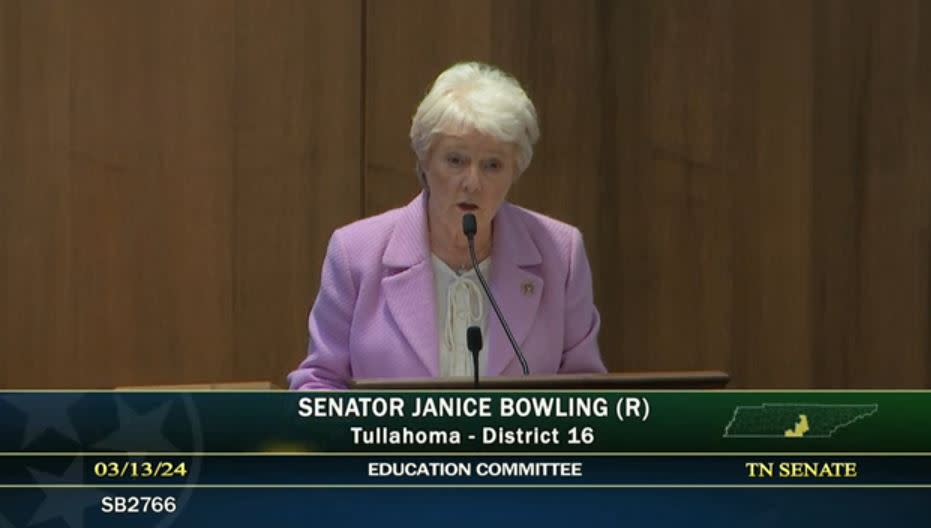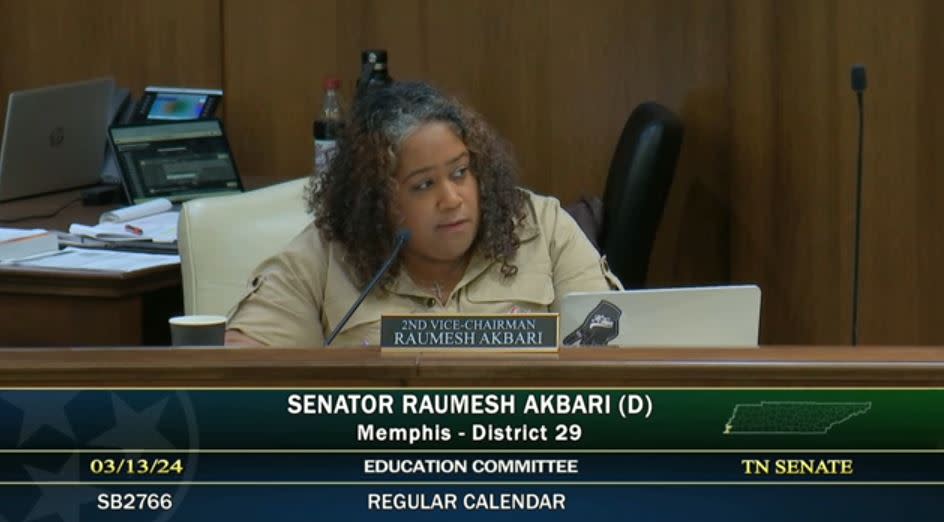Bill changes anti-discriminatory language in Tennessee teacher code of ethics

- Oops!Something went wrong.Please try again later.
NASHVILLE, Tenn. (WKRN) — A bill moving its way through the legislature would remove some language referencing gender identity from the state’s mandated family life curriculum and change antidiscrimination provisions in the teacher code of ethics.
Brought by Tullahoma Sen. Janice Bowling, SB2766 would shorten the Teacher Code of Ethics, removing a distinct reference to preventing discrimination on the basis of sexual orientation and instead opting for broader phrasing.
Currently, the Teacher Code of Ethics enshrined in law in Tennessee states teachers will not discriminate against students on the basis of “race; color; creed; disability; sex; national origin; political or religious beliefs; family, social or cultural background; or sexual orientation.”
Bowling’s bill would shorten that list by removing the language “family, social, or cultural background; or sexual orientation” from the Code. The bill would instead use the phrase “family background; or the student’s membership in a protected class under federal or state law.”
Read the latest from the TN State Capitol Newsroom
During a Senate Education Committee meeting Wednesday, March 13, Bowling said the bill was meant to clean up language in the law and be “more inclusive” of “all students.”
“It will revise language preventing the discriminating against students on certain specified bases to generally prohibiting educators from discriminating against students who are members of a protected class under federal and state law, and it removes the definition of gender identity from the family life curriculum,” she said.

Current state law defines gender identity, as it relates to the family life curriculum, as the same definition it carries in the Diagnostic and Statistical Manual of Mental Illnesses (DSM-5), the professional reference book for the American Psychiatry Association. Bowling’s bill would remove that definition from the introductory section of state law on the family life curriculum.
However, Sen. Raumesh Akbari (D-Memphis) found the measure to be more discriminatory than not, asking Bowling what the purpose of the bill really was.
CMA Fest 2024: Artist Lineup announced
“If these folks are already protected, why are we making these changes?” she asked.
Bowling said the purpose of the bill was to remove language that was “in and of itself discriminatory.”
“It’s saying that only those students should not be discriminated against, should not be talked to rudely, should not be kept from doing things when, in fact, this kind of cleans up the code,” Bowling said. “Obviously, a teacher should not treat any student unfairly, so this is cleaning up that code.”
Akbari said it seemed to her that the existing code was making sure those students were protected, and the better way to approach the law was to add to it, but Bowling’s proposed changes “could potentially exclude some folks who were previously protected.”
Bowling reiterated that her bill was “very inclusive,” in that it protected “everyone.”
When asked by Akbari why Bowling wanted to remove the definition of gender identity from the family life curriculum, Bowling only answered by saying that the definition was contained in the DSM-5 and was classified as a “mental disorder.”

TN Senate Republicans effectively kill food tax cut proposal
Akbari then said removing the definition would be exclusionary.
“It was placed in the curriculum for a reason, and I think that as we talk about individuals and who they are and what makes them unique, certainly, taking out the concept and the definition of gender identity in and of itself excludes an entire segment of the population,” she said. “Are you saying that you are removing that because gender identity is a mental disorder?”
“What this bill does is make all school children included in being able to do things. It doesn’t differentiate between people. I think part of our culture has become so discriminatory because, in the eyes of some, because everybody has a label. I think if we were to return to the fact that we are people, that we are students, that we are adults, that that would be a very helpful thing for everyone,” Bowling said.
Akbari countered by saying having a label wasn’t exclusionary but descriptive, adding she hoped the state wouldn’t move backwards.
“Identifying someone for their uniqueness is not exclusive of other people,” she said. “It’s like when we talk about equality: it’s not pie. Everybody can have a piece of their share of what they believe.”
By saying the state won’t acknowledge those differences in students, Akbari said that seemed more discriminatory than how current law states.
⏩ Read today’s top stories on wkrn.com
“When you take out something as specific as gender identity you’re doing a real harm to students and adults alike across this state,” she said.
Bowling’s bill ultimately passed the Senate Education Committee 6-1-2, sending it onto the committee on calendar – the last stop before it hits the full Senate floor.
The House version of the bill, brought by Rep. Gino Bulso (R-Brentwood) will be discussed at the March 19 meeting of the House K-12 Subcommittee.
For the latest news, weather, sports, and streaming video, head to WKRN News 2.

